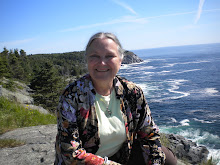They're cutting down eucalyptus trees in California, the fragrant giants with the shreddy bark that yield those deodorizing shoots that populate people's bathrooms everywhere. Natives of Australia, they love it here. Native species are being crowded out.
Speaking of attractive invaders, I learned that there's some controversy about the two flocks of parrots living in the San Francisco area. Like the eucalyptus, the parrots are not native. The ones I found out about are the green ones with the red heads that were flying around on Fort Mason, near where I stayed. They originally came from Chile, caught wild and sold in the U.S. as pets. These feisty birds did not want to be pets. They either (a) escaped their cages, or (b) made life so miserable for their owners that the humans set them free. Now they live on Telegraph Hill and at Fort Mason, and in other scattered locations. Food and nesting sites are plentiful.
Are they displacing native species? The people who like them say no, but others say yes. Are they a more attractive version of the English sparrow -- sturdy and indefensible? We humans ourselves have certainly displaced a lot of native species. I saw the results of total logging of the redwood forests that once covered the hills of the Western edge of this part of North America. Great expanses of green pasture for dairy and beef cattle stretch out across the parts of Marin and Sonoma Counties I traveled through. The redwood has been totally defeated there, it would seem.
But here where I am staying now, in the Russian River valley, the redwoods are returning. Some of the little frame vacation houses in this neighborhood are set among younger redwood trees that tower over them. There's a feeling of strength about these trees. When I see them standing strong over the flimsy human habitations below, I sense their roots growing under the buildings to throw the little dead things off balance, trunks growing outward to push them aside, branches conspiring with the fog that rolls in from the coast to create a destructive dampness and shade. Of course, they can't win a war with humans. If they get too pushy, they'll be cut down again, unless there are enough humans that like them well enough to say they should be allowed their space.
I think we could be sharing more of "our" space with redwoods. I don't know what we should do about the wily eucalyptus invaders. I like the parrots, and I don't like English sparrows, but should it be a matter of like? I like the looks of purple loostrife, but I don't like what it does to New England wetlands. Should we be guided by who was there first? Or guilt about our own earlier negligent or destructive ways? This matter of a globalized ecosystem is not simple. For sure, we humans need to take more notice of our relationships with the other beings around us. We need to take more care of our place in the interconnected web of all existence. Easy to say, but not so easy to arrange.
Subscribe to:
Post Comments (Atom)

No comments:
Post a Comment